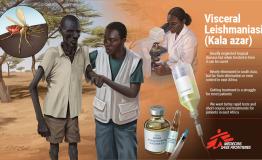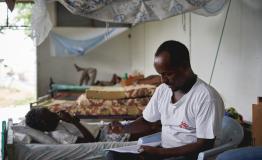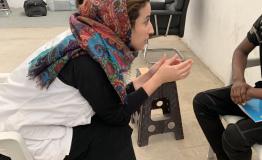

Sleeping Sickness
Sleeping sickness is a parasitic infection that kills. Generally known as sleeping sickness, human African trypanosomiasis is transmitted by tsetse flies.
Tsetse flies are found in 36 countries in sub-Saharan Africa, putting 65 million people at risk. The infection attacks the central nervous system, causing severe neurological disorders and death if left untreated.
According to the World Health Organization (WHO), more than 98 per cent of reported cases are caused by the parasite Trypanosoma brucei gambiense, which is found in western and central Africa.
The second form, Trypanosoma brucei rhodesiense, accounts for less than two per cent of cases and is found in eastern and southern Africa.
In the last 10 years, over 70 per cent of reported cases occurred in the Democratic Republic of Congo.
Sustained control efforts have reduced the number of new cases. In 2009, the number of reported cases dropped below 10,000 for the first time in 50 years.
According to the WHO, there were 977 cases of sleeping sickness reported in 2018.
About Sleeping Sickness
The parasite causing sleeping sickness is transmitted to humans through infected tsetse flies, which breed in warm and humid areas.
Inhabiting the vast savannah across sub-Saharan Africa, tsetse flies come into contact with people, cattle and wild animals, all acting as reservoirs for the Trypanosoma parasites.
The first stage of sleeping sickness presents with non-specific symptoms such as fever, headache, weakness, itching and joint pain.
At this stage, sleeping sickness is easy to treat but difficult to diagnose.
If no treatment is given, the parasite will invade the infected person’s central nervous system and the second stage sets in.
Named after one of its most striking symptoms, patients with sleeping sickness experience an inability to sleep during the night but are often overcome by sleep during the day.
They may also begin to show other neurological or psychiatric symptoms, such as poor coordination, confusion and convulsions.
Diagnosing sleeping sickness before the second stage of the disease is difficult due to the non-specific symptoms of the early stage.
Once the parasite is detected, a painful lumbar puncture must be made to examine the patient’s cerebrospinal fluid.
This will determine the stage of the disease and the appropriate treatment.
The type of treatment depends on the stage of the disease. Drugs used in the first stage of the disease are safer and easier to administer than those for the second stage.
However, treatment success in the second stage of the disease depends on drugs that cross the blood-brain barrier to reach the parasite. Such drugs are toxic and complicated to administer.
A new drug, fexinidazole – the first all-oral treatment that works for both stages of the disease – has been developed by Drugs for Neglected Diseases initiative (DNDi) and received approval in late 2018.
While it is being made gradually available, nifurtimox-eflornithine combination therapy, or NECT, is a safe, highly effective but cumbersome treatment developed by MSF, DNDi and Epicentre in 2009.
NECT is currently the WHO's recommended first-line treatment for the gambiense form.
Prevention efforts, such as vector control, are crucial to our efforts to keep sleeping sickness at bay. However, exhaustive screenings require a major investment in human and material resources.
In 2018, MSF treated 80 people for sleeping sickness.


Neglected Tropical Diseases: ‘Incredible progress has been made but there’s still a long way to go’

MSF’s ‘Access Campaign’ marks 20 years of work
